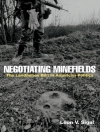This important book reassesses a defining historical, political and ideological moment in contemporary history: the 1989 revolutions in central and eastern Europe. Adopting a multi-disciplinary approach, the authors reconsider such crucial themes as the broader historical significance of the 1989 events, the complex interaction between external and internal factors in the origins and outcomes of the revolutions, the impact of the ‘Gorbachev phenomenon’, the West and the end of the Cold War, the political and socio-economic determinants of the revolutionary processes in Poland, Hungary, the German Democratic Republic, Czechoslovakia, Romania and Bulgaria, and the competing academic, cultural and ideological perceptions of the year 1989 as communism gave way to post-communist pluralism in the 1990s and beyond. Concluding that the contentious term ‘revolution’ is indeed apt for the momentous developments in eastern Europe in 1989, this book will be essential reading for undergraduates, postgraduates and specialists alike.
表中的内容
Timeline – Eastern Europe, 1945–91
Leaders of East European and Soviet communist parties, 1945–91
East European communist parties and their post-communist successors
1.The collapse of communism in Eastern Europe: origins, processes, outcomes – Kevin Mc Dermott and Matthew Stibbe
I. The historical longue durée
2. Echoes and precedents: 1989 in historical perspective – Robin Okey
II. The Gorbachev factor
3. The multifaceted external Soviet role in processes towards unanticipated revolutions – Mary Buckley
4. ‘When your neighbour changes his wallpaper’: the ‘Gorbachev factor’ and the collapse of the German Democratic Republic– Peter Grieder
III. The East European revolutions: internal and external perspectives
5. The demise of communism in Poland: a staged evolution or failed revolution? – Tom Junes
6. The international context of Hungarian transition, 1989: the view from Budapest – Lászl? Borhi
7. Creating security from below: peace movements in East and West Germany in the 1980s – Holger Nehring
8. The demise of the communist regime in Czechoslovakia, 1987-89: a socio-economic perspective – Michal Pullmann
9. Discourse and power: the FSN and the mythologisation of the Romanian revolution – Kevin Adamson and Sergiu Florean
10. A revolution in two stages: the curiosity of the Bulgarian case – Elena Simeonova
IV. Then and now: continuity and change in the academic and cultural perceptions of the communist era and its aftermath
11. A hopeless case of optimism? Jürgen Kuczynski and the end of the GDR – Matthew Stibbe
12. Meanings of 1989: right-wing discourses in post-communist Poland – Artur Lipinski
13. From the ‘thirst for change’ and ‘hunger for truth’ to a ‘revolution that hardly happened’: public protests and reconstructions of the past in Bulgaria in the 1990s – Nikolai Vukov
14 Afterword: the discursive constitution of revolution and revolution envy – James Krapfl
Select bibliography
Index
关于作者
Matthew Stibbe is Professor of Modern European History at Sheffield Hallam University












